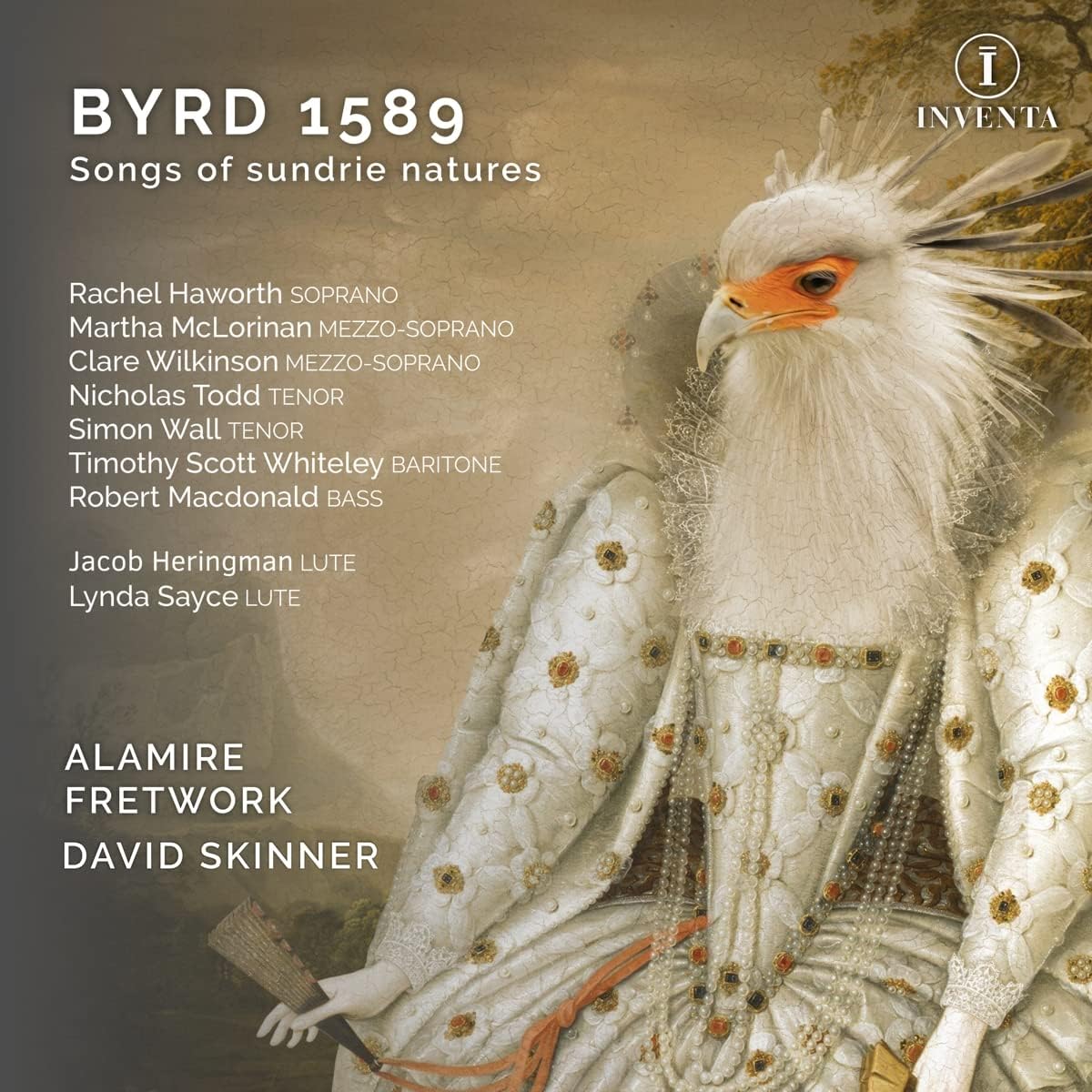Alamire, Fretwork, David Skinner
122:37 (2 CDs in a single case)
Inventa INV1011
Alamire and Fretwork continue their great work on behalf of Byrd, under the direction of David Skinner, by following up their complete recording of his Psalmes, sonets and songs of 1588 with this double album consisting of the Songs of sundrie natures 1589. In an important respect this new release is even more significant because it includes so many premiere recordings from this more neglected collection. For instance, of the Seven Penitential Psalms that begin the disc, only three have ever received commercial recordings. Just a few of the pieces have received repeated attention – such as the majestic consort anthem Christ rising again and the bucolic duet Who made thee Hob forsake the plough – but now we can revel in the likes of the first complete recording of the exquisite Wounded I am, the first commercial recording of what David in his note calls “this epic tale” From Citheron the warlike boy is fled and only the second recording of the sublime sacred song O Lord my God. The two carols for Christmas Day – From virgin’s womb and An earthly tree – have of late begun at last to receive appropriate attention on disc, performed with both their two sections intact and accompanied by viols. This is definitively the case here, and they also demonstrate the high quality of Alamire’s soloist Martha McLorinan; she is joined by the equally admirable Clare Wilkinson in Christ rising and Who made thee Hob mentioned above, and both mezzos also sing separate solo songs; Unlike the 1588 songs, many of which survive in pre-publication sources as consort songs which Byrd subsequently adapted as partsongs for publication, those in 1589 are almost all original partsongs; just three survive as consort songs in sources predating the print. Of these, I thought that love and When first by force are performed as in the print, but See those sweet eyes is sung enchantingly by Clare Wilkinson in its original solo format. The violists of Fretwork provide excellent accompaniments whenever required, as do star lutenists, Jacob Heringman and Lynda Sayce, for the five stunning secular songs that are in three parts.
As in 1588, there is a wide variety of mood, illustrated well by the almost curt and flirtatious I thought that love had been a boy sitting next to the impassioned and emotional O dear life to words by Sir Philip Sidney; indeed, the teeming creativity that gushes from the ten works in the section of songs in five parts could stand as an epitome of the entire collection. Alamire and David respond sensitively to all of Byrd’s different musical perspectives. Indeed, this is a collection simply crammed full of delights, both spiritual and emotional, all the better for the listener with such a high proportion of the songs being in the main unfamiliar. The initial sequence of seven psalms in three parts might seem forbidding, but do as Byrd himself suggests, listen a few times, and even here in these ostensibly austere works many beauties emerge; earlier this Byrd Quatercentenary year I had the pleasure of attending a concert in Norwich given by the outstanding Marian Consort, during which they sang the dourly-texted Lord in thy wrath correct me not and its concluding bars radiated beauty, which beauty is conveyed equally well on this recording. The more luxuriant Unto the hills mine eyes I lift in six parts, with its own plodding text, possesses a Flemish quality reminding us of Byrd’s familiarity with the glorious works of Jacob Clement, “Clemens non Papa”. One could go on throughout the entire set – there is not a work among them all which is less than excellent, and which does not repay repeated listening.
The Sixteen have beaten Alamire to recording Byrd’s third and final collection of songs, the Psalmes, songs, and sonnets of 1611, but Alamire have provisional plans for a possible celebration of another Byrd anniversary in 2024 which, if it comes to fruition, would be just as exciting as all the foregoing. Meanwhile, it remains yet again to recommend without reservation the album under review, to compliment Alamire on making some hitherto hidden masterpieces by Byrd accessible to the worldwide public, and to congratulate Alamire, Fretwork, David and the soloists on a job superbly done. And let’s have a minute’s applause for William, who made it all possible.
Richard Turbet
